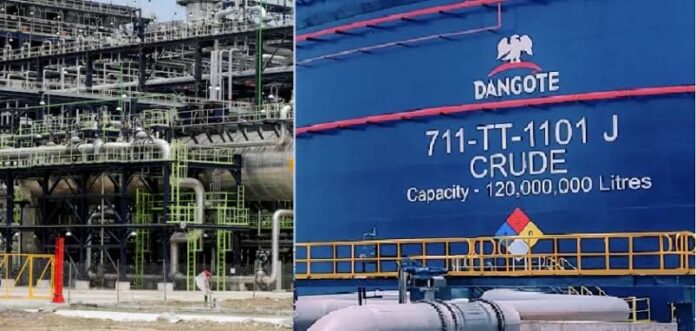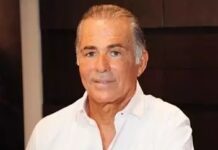NNPCL to become sole buyer from Dangote refineries amid scarcity
The Nigerian National Petroleum Company (NNPC) Limited is poised to become the “initial exclusive buyer” of products from the Dangote Refinery as the 650,000-barrel-per-day plant begins processing premium motor spirit (PMS), also known as petrol, according to a report.
This development comes amid worsening fuel supply issues in Nigeria, with the NNPCL indicating that the supply gap might worsen due to its indebtedness to importers.
After several denials, the national oil company admitted on Sunday that it is facing financial difficulties, with reports indicating that the company owes over $6 billion.
This development follows the NNPCL’s recent publication of its 2023 audited financial statement, which declared a dividend of N3.1 trillion.
Fuel supply has been severely disrupted nationwide, with many NNPCL retail outlets closed and motorists paying up to N1000 per litre.
However, a Reuters report confirmed yesterday that the Dangote Refinery is set to begin petrol production in the coming weeks, as testing has commenced. The NNPC is expected to be the “initial exclusive buyer,” a move anticipated to help address the current supply gap.
Devakumar Edwin, Vice President at Dangote Industries Limited, stated that the NNPC is prepared to purchase the refinery’s products exclusively to meet local demand.
“We are testing the product (gasoline), and it will soon start flowing into the storage tanks. If there is no buyer, we will export it, as we have been doing with our aviation jet fuel and diesel,” Edwin said. However, he did not specify when the product will be available on the market.
When contacted yesterday, NNPC Chief Corporate Communications Officer Mr. Olufemi Soneye said he was not aware of the deal with Dangote.
“I am not aware of that,” he said, adding that he doubted Dangote would sell below N1000 per litre. “I don’t think marketers would buy at that rate. So, the sure bet is to sell to NNPC, but at what rate will NNPC be buying?”
Fuel scarcity has worsened in Abuja, Lagos, and other parts of the country, with a litre selling for as much as N1000.
In Abuja, both travelers and motorists are grappling with the severe shortage.
Further findings revealed that filling stations operated by both independent and major oil marketers within Abuja and some area councils of the FCT have remained closed due to a lack of fuel.
A visit by newsmen to some filling stations showed long queues of vehicles and motorcycles waiting to buy fuel.
At the AA Rano filling station along Kubwa Expressway, a long line of vehicles was waiting to refill their tanks, while some motorists were seen with containers, struggling to purchase fuel.
At the Enyo filling station in Zuba, Gwagwalada Area Council, one of the satellite towns in the FCT, newsmen observed a long queue of vehicles and motorcycles waiting to refill their tanks.
Despite the long queues, fuel was being sold for between N980 and N1,200 per litre, while some filling stations remained closed.
At Doma filling station, located along Secretariat Road in Gwagwalada metropolis, there was also a long queue of vehicles and motorcycles. Journalists observed that a litre of PMS was being sold for N987 per litre.
However, some motorists who spoke with newsmen expressed their frustration over the fuel scarcity, which they said has caused serious hardship.
Journalists further observed that the fuel shortage and the increase in transport fares have forced many residents, especially civil servants, to walk within the city center of Abuja, with some even trekking to their workplaces.
A commercial driver, Mr. Clement Azuibuke, told our reporter that the fuel scarcity has forced him to park his car at home.
Another motorist, Samson Kaura, also a commercial driver who shuttles between Gwagwalada and Garki Area 1, said the ongoing fuel scarcity in Abuja and its environs has caused more hardship, particularly for civil servants, with 85 percent of them forced to leave their vehicles at home.
A director of one of the petrol stations, Alhaji Yahuza Abdullahi, blamed the NNPCL for the persistent fuel scarcity in Abuja and its environs.
Despite the long queues at nearly all NNPC filling stations, one of our correspondents reported that there has been no increase in fuel prices, with a litre still being sold at N617, while non-NNPC stations sell the product for between N700 and N720 per litre.
The stations visited included Rain Oil, Amadeed, AA Rano, and Nipco in Gwarimpa and along Airport Road in Lugbe.
Kasim Atiku, a commercial motorist, told newsmen that he had spent hours in a queue at an NNPC filling station in Gwarimpa.
Another motorist, Sani Funtua, who spoke to our reporter by phone, lamented the impact of the fuel scarcity on his taxi business.
In Lagos, the worsening scarcity has forced motorists to increase intrastate transportation fares due to a shortage of buses during peak hours, prompting drivers to hike fares.
A commuter who identified herself as Victoria expressed concerns over the fare hikes, stating that the fare from Kola to Igando has increased by over 100 percent.
Checks by newsmen indicated that most NNPC filling stations were not dispensing fuel, while there was gridlock at some major stations that were dispensing yesterday.
It was observed that all three NNPC stations along Ogunnusi Road, which connects to the Lagos-Ibadan Expressway, were not dispensing fuel.
Due to the gridlock at the few stations that were dispensing, officers of the Nigeria Police, Lagos Command, and the Lagos State Traffic Management Authority (LASTMA) have extended their services daily to filling stations congested with long queues in Lagos.
It was observed the presence of these joint officers at Total and Northwest filling stations along Mobolaji Bank-Anthony Expressway, MRS in Ikeja, and a few other locations.
“We are working with stakeholders to address the scarcity.”
Speaking further with newsmen, Soneye reiterated that the NNPC is working with relevant stakeholders to address the fuel shortage. He said, “I think the important thing for us, on our part, is to let the whole world know that we are in trouble if we continue. NNPC has been paying N500 per litre for every Nigerian that has been buying fuel over the past year.”
He added, “The truth is that Nigerians have been getting cheap fuel because the NNPC is subsidizing it. NNPC has been bearing the shortfall, and it is now unbearable. The landing cost is N1,100 per litre, and that shortfall is what we have been covering.”
He stated that it is now up to the owners of the NNPC and the federal government to decide the next course of action.
Proofreading by Uchechi Ojo, Sub-editor at Neptune Prime.
Follow the Neptune Prime channel on WhatsApp: https://whatsapp.com/channel/0029Va74ZvU2v1IqKByXoX3d
Do you have breaking news, interview request, opinion, suggestion, or want your event covered? Email us at neptuneprime2233@gmail.com
Follow the Neptune Prime channel on WhatsApp:
Do you have breaking news, interview request, opinion, suggestion, or want your event covered? Email us at neptuneprime2233@gmail.com





